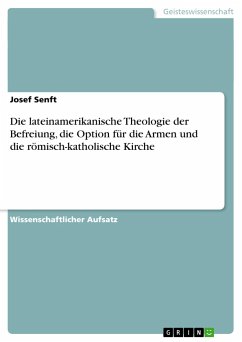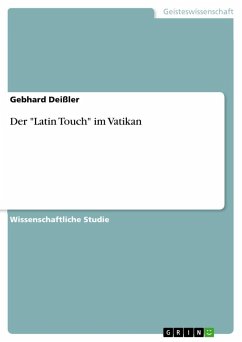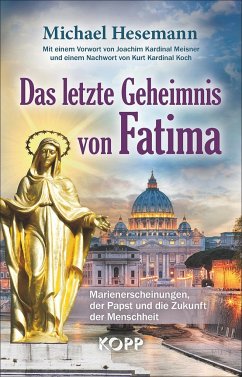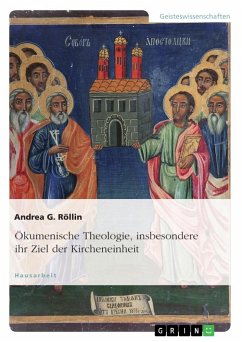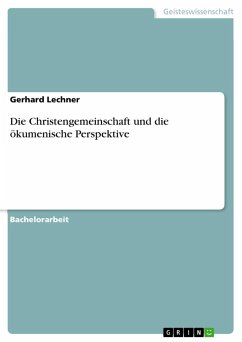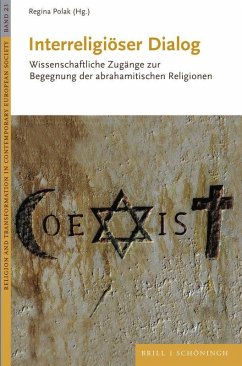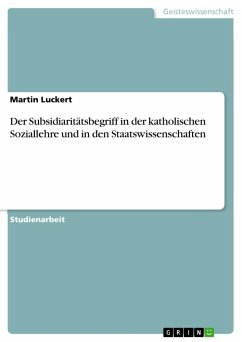Nicht lieferbar
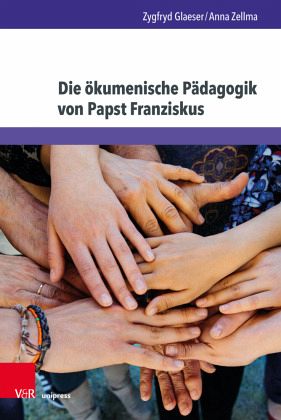
Die ökumenische Pädagogik von Papst Franziskus
Auf dem Weg zu einem neuen Verständnis von Martin Luther und seinem Erbe
Versandkostenfrei!
Nicht lieferbar
Zygfryd Glaeser und Anna Zellma fassen die entscheidenden Elemente der ökumenischen Lehre von Papst Franziskus im Kontext seiner Verweise sowohl auf Martin Luther als auch auf die allgemein verstandene lutherische Tradition zusammen. Sie behandeln dabei nicht nur die historischen Aspekte der schwierigen Debatte über den Reformer von Wittenberg und sein Erbe, sondern thematisieren auch die Impulse von Franziskus Vorgängern, die mit verschiedenen Stereotypen und Vorurteilen in Bezug auf die Luther- und Reformationsforschung brechen. Die ökumenische Lehre von Papst Franziskus basiert auf der ...
Zygfryd Glaeser und Anna Zellma fassen die entscheidenden Elemente der ökumenischen Lehre von Papst Franziskus im Kontext seiner Verweise sowohl auf Martin Luther als auch auf die allgemein verstandene lutherische Tradition zusammen. Sie behandeln dabei nicht nur die historischen Aspekte der schwierigen Debatte über den Reformer von Wittenberg und sein Erbe, sondern thematisieren auch die Impulse von Franziskus Vorgängern, die mit verschiedenen Stereotypen und Vorurteilen in Bezug auf die Luther- und Reformationsforschung brechen. Die ökumenische Lehre von Papst Franziskus basiert auf der respektvollen Begegnung mit anderen. Diese Begegnung hat den Charakter eines dialogischen Zeugnisses, das auf außergewöhnliche Weise durch die persönliche Teilnahme des Papstes am 500. Jahrestag der Reformation demonstriert wurde. Papst Franziskus ist nicht nur Lehrer, sondern auch Erzieher: Er ermutigt sowohl Katholiken als auch Lutheraner zur Bekehrung und zur Änderung ihrer Denkweise.
The authors synthesize the crucial elements within ecumenical teaching of Pope Francis in the context of his references both to Martin Luther and to the broadly understood Lutheran tradition. They examine the historical aspects of the difficult debate about Reformer of Wittenberg and his legacy and also involve the impulses of Francis predecessors (such as John Paul II and Benedict XVI) which break various stereotypes and prejudices concerning Luther and Reformation research. The ecumenical teaching of Pope Francis is based upon being completely respectful during encounter with the other. This encounter has the character of dialogical testimony which is demonstrated in a extraordinary way through the personal participation of the Pope in the 500th year anniversary of the Reformation. Pope Francis is not just a teacher, but is also an educator. He encourages both Catholics and Lutherans to conversion, to changing their way of thinking about each other.
The authors synthesize the crucial elements within ecumenical teaching of Pope Francis in the context of his references both to Martin Luther and to the broadly understood Lutheran tradition. They examine the historical aspects of the difficult debate about Reformer of Wittenberg and his legacy and also involve the impulses of Francis predecessors (such as John Paul II and Benedict XVI) which break various stereotypes and prejudices concerning Luther and Reformation research. The ecumenical teaching of Pope Francis is based upon being completely respectful during encounter with the other. This encounter has the character of dialogical testimony which is demonstrated in a extraordinary way through the personal participation of the Pope in the 500th year anniversary of the Reformation. Pope Francis is not just a teacher, but is also an educator. He encourages both Catholics and Lutherans to conversion, to changing their way of thinking about each other.







